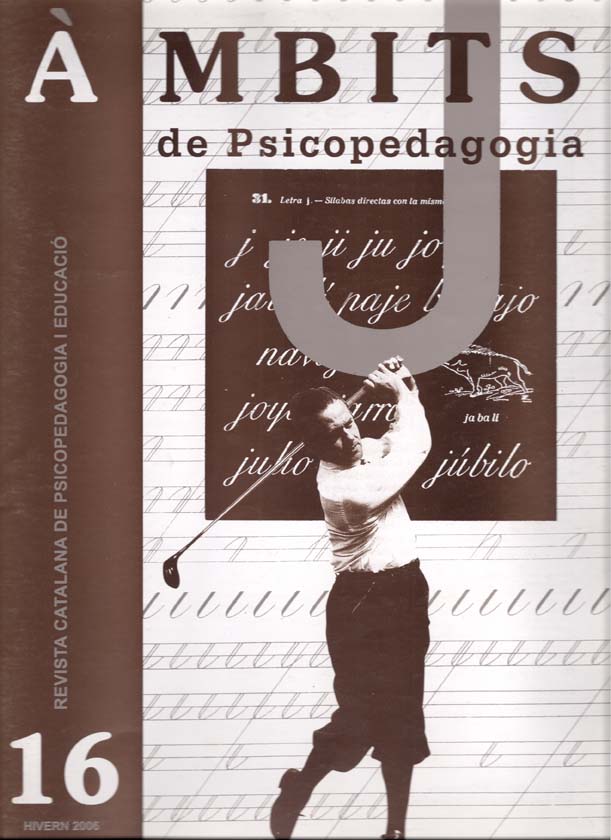Autism and inclusion : some keys to think about
Abstract
Autism is one of the disorders that may cause doubt when talking about inclusion. In the article some key concepts and ideas that should make eaisr the inclusion of these pupils. In the same way, these key concepts shpoul be a guide for thinking about autism and school.
References
AINSCOW, M & BOOTH, T. (2002): Index for Inclusion. Developing learning and participation in schools. Bristol: Center for the Study of Inclusive Education (CSIE). Traducción y próxima publicación por el Servicio de Publicaciones del Departamento de Educación, Universidades e Investigación del Gobierno Vasco.
Departamento de Educación del Gobierno Vasco (2003): Programas de Innovación educativa.2003-2006. Vitoria: Servicio de Publicaciones del Gobierno Vasco.
MENDÍA, R.: La evaluación de la competencia curricular. Material por publicar.
PORTER, G. & RICHLER, D., Eds. (1991): Changing Canadian Schools: Perspectives on disability and inclusion. Toronto, Ontario: G. Allan Roeher Institute.
BONDY, A. & FROST, L. (1994): The Picture Exhange Communication system: training manual. New Cherry Hill, N.J.: Pyramid Educational Consultants.
CENTRO NACIONAL DE RECURSOS (1989): Necesidades educativas especiales en la escuela ordinaria. Madrid, CNREE
HERRERO, J.M. (1995): “¡O se lo enseñamos ahora o (probablemente) no lo aprenderán nunca! El dilema de tomar decisiones sobre el qué y el cómo enseñar a los alumnos con autismo y con otros trastornos graves del desarrollo”. En Autismo: La respuesta educativa. Actas del VIII Congreso Nacional de AETAPI. Madrid: Aetapi.
RIVIÈRE, A. (1997): “El tratamiento del autismo como trastorno del desarrollo: principios generales”. En A. Rivière y J. Martos (comp.): El tratamiento del autismo. Nuevas perspectivas. Madrid: IMSERSO
SCAHEFFER, B.; MUSIL, A. y KOLLINZAS, G. (1980): Total Communication: A signed sepeech program for non-verbal children. Champaing, Illinois: Research Press
TAMARIT, J. (1989): “Uso y abuso de los sistemas de comunicación”. Comunicación, Lenguaje y Educación, 1, 81-94
WATSON, L.; LORD, C.; SCHAFFER, B. y SCHOPLER, E. (1989): Teaching Spontaneous Communication to Autistic and Developmentally Handicapped Children. New York: Irvington Pu
Departamento de Educación del Gobierno Vasco (2003): Programas de Innovación educativa.2003-2006. Vitoria: Servicio de Publicaciones del Gobierno Vasco.
MENDÍA, R.: La evaluación de la competencia curricular. Material por publicar.
PORTER, G. & RICHLER, D., Eds. (1991): Changing Canadian Schools: Perspectives on disability and inclusion. Toronto, Ontario: G. Allan Roeher Institute.
BONDY, A. & FROST, L. (1994): The Picture Exhange Communication system: training manual. New Cherry Hill, N.J.: Pyramid Educational Consultants.
CENTRO NACIONAL DE RECURSOS (1989): Necesidades educativas especiales en la escuela ordinaria. Madrid, CNREE
HERRERO, J.M. (1995): “¡O se lo enseñamos ahora o (probablemente) no lo aprenderán nunca! El dilema de tomar decisiones sobre el qué y el cómo enseñar a los alumnos con autismo y con otros trastornos graves del desarrollo”. En Autismo: La respuesta educativa. Actas del VIII Congreso Nacional de AETAPI. Madrid: Aetapi.
RIVIÈRE, A. (1997): “El tratamiento del autismo como trastorno del desarrollo: principios generales”. En A. Rivière y J. Martos (comp.): El tratamiento del autismo. Nuevas perspectivas. Madrid: IMSERSO
SCAHEFFER, B.; MUSIL, A. y KOLLINZAS, G. (1980): Total Communication: A signed sepeech program for non-verbal children. Champaing, Illinois: Research Press
TAMARIT, J. (1989): “Uso y abuso de los sistemas de comunicación”. Comunicación, Lenguaje y Educación, 1, 81-94
WATSON, L.; LORD, C.; SCHAFFER, B. y SCHOPLER, E. (1989): Teaching Spontaneous Communication to Autistic and Developmentally Handicapped Children. New York: Irvington Pu
Downloads
Published
2006-01-15
Issue
Section
Educational Psychology and Counselling
License
The authors maintain their copyright and give the right to the first publication of the work to the journal, registered under a Creative Commons Attribution-Non Commercial-NoDerivs license. This license allows others to download the works and to share them with others as long as they credit the author, but it does not allow for any kind of modification or commercial use.















